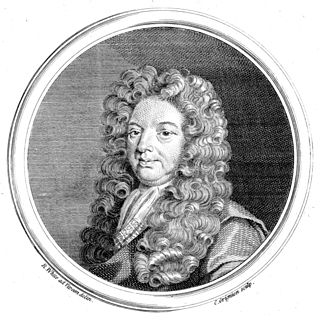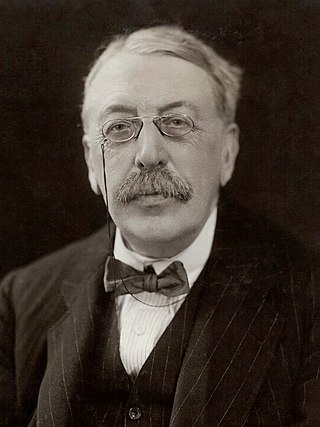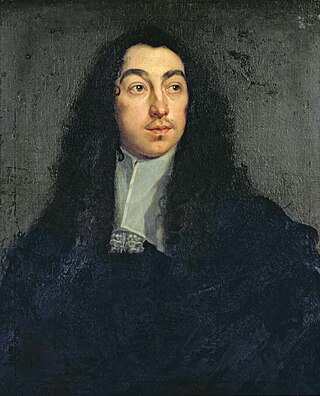Related Research Articles

Henry Purcell was an English composer of Baroque music.

A symphony is an extended musical composition in Western classical music, most often for orchestra. Although the term has had many meanings from its origins in the ancient Greek era, by the late 18th century the word had taken on the meaning common today: a work usually consisting of multiple distinct sections or movements, often four, with the first movement in sonata form. Symphonies are almost always scored for an orchestra consisting of a string section, brass, woodwind, and percussion instruments which altogether number about 30 to 100 musicians. Symphonies are notated in a musical score, which contains all the instrument parts. Orchestral musicians play from parts which contain just the notated music for their own instrument. Some symphonies also contain vocal parts.

Ralph Vaughan Williams was an English composer. His works include operas, ballets, chamber music, secular and religious vocal pieces and orchestral compositions including nine symphonies, written over sixty years. Strongly influenced by Tudor music and English folk-song, his output marked a decisive break in British music from its German-dominated style of the 19th century.

John Blow was an English composer and organist of the Baroque period. Appointed organist of Westminster Abbey in late 1668, his pupils included William Croft, Jeremiah Clarke and Henry Purcell. In 1685 he was named a private musician to James II. His only stage composition, Venus and Adonis, is thought to have influenced Henry Purcell's later opera Dido and Aeneas. In 1687, he became choirmaster at St Paul's Cathedral, where many of his pieces were performed. In 1699 he was appointed to the newly created post of Composer to the Chapel Royal.

Sir Henry Joseph Wood was an English conductor best known for his association with London's annual series of promenade concerts, known as the Proms. He conducted them for nearly half a century, introducing hundreds of new works to British audiences. After his death, the concerts were officially renamed in his honour as the "Henry Wood Promenade Concerts", although they continued to be generally referred to as "the Proms".

William Boyce was an English composer and organist. Like Beethoven later on, he became deaf but continued to compose. He knew Handel, Arne, Gluck, Bach, Abel, and a very young Mozart, all of whom respected his work.

Henry Lawes was the leading English songwriter of the mid-17th century. He was elder brother of fellow composer William Lawes.

Sir Charles Villiers Stanford was an Anglo-Irish composer, music teacher, and conductor of the late Romantic era. Born to a well-off and highly musical family in Dublin, Stanford was educated at the University of Cambridge before studying music in Leipzig and Berlin. He was instrumental in raising the status of the Cambridge University Musical Society, attracting international stars to perform with it.
The Royal Academy of Music (RAM) in London, England, is one of the oldest music schools in the UK, founded in 1822 by John Fane and Nicolas-Charles Bochsa. It received its royal charter in 1830 from King George IV with the support of the first Duke of Wellington.
"Lillibullero" is a march attributed to Henry Purcell that became popular in England at the time of the Glorious Revolution of 1688.

John Playford (1623–1686) was a London bookseller, publisher, minor composer and member of the Stationers' Company. He published books on music theory, instruction books for several instruments and psalters with tunes for singing in churches. He is perhaps best known today for his publication of The English Dancing Master in 1651.

Matthew Locke was an English Baroque composer and music theorist.

King Arthur, or The British Worthy, is a semi-opera in five acts with music by Henry Purcell and a libretto by John Dryden. It was first performed at the Queen's Theatre, Dorset Garden, London, in late May or early June 1691.

Ernst Hermann Ludimar Meyer was a German composer and musicologist, noted for his expertise on seventeenth-century English chamber music.
In music, a catch is a type of round or canon at the unison. That is, it is a musical composition in which two or more voices repeatedly sing the same melody, beginning at different times. Generally catches have a secular theme, though many collections included devotional rounds and canons.
Events from the year 1677 in England.
Edward Purcell (1689–1740) was an English organist and composer.
Nymphs and Shepherds is a song by the English composer Henry Purcell, from the play The Libertine by Thomas Shadwell. When the play was first performed, in 1675, the accompanying music was by William Turner. Purcell's music was first used in either 1692 or 1695; the musicologist Ian Spink has concluded that the latter year is the more probable, although the earlier date is often cited.
The English symphony song was a musical genre of baroque music best known in the compositions of Henry Purcell and his contemporaries including his teacher John Blow. In the symphony song voices and continuo were enriched with ritornelli for violins or a pair of recorders. Among the earliest symphony songs are four published by Oxford composer Henry Bowman in 1677. John Blow's most notable early example is "Awake, awake my lyre". The symphony song was a genre mainly linked to the Restoration royal court, just as the symphony anthem was linked to the English Chapel Royal. Purcell's symphony songs were probably written for performance by members of the Private Music in the royal apartments.

Drexel 3976, also known as The Rare Theatrical, is a 17th-century music manuscript compilation of works by the composer Matthew Locke, considered by some to be "the father of all Restoration dramatic music." The manuscript is a significant source of Locke's instrumental dramatic music with many works not known through any other source, although the contexts of the individual works and the names of the plays which they are from has not been documented.
References
- ↑ (Wood, Athenæ Oxon. (Bliss), i. xxv).
- ↑ Purcell Symphony songs
![]() This article incorporates text from a publication now in the public domain : "Bowman, Henry". Dictionary of National Biography . London: Smith, Elder & Co. 1885–1900.
This article incorporates text from a publication now in the public domain : "Bowman, Henry". Dictionary of National Biography . London: Smith, Elder & Co. 1885–1900.